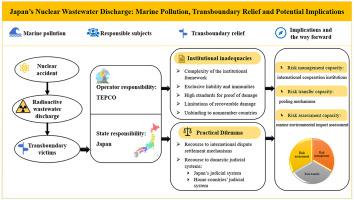全球能源短缺趋势加速了许多国家的核设施建设。但是,一旦发生核事故,可能会造成严重的风险和长期的环境破坏。福岛核灾难的发生引发了关于乌尔里希贝克所谓的“风险社会”的重要问题。特别是日本随后的核废水排放计划,将安装国的核风险与邻国乃至全人类的海洋环境风险联系在一起,不仅引发了许多潜在的海洋环境冲突,也引发了哪些社区应该承担风险的正义问题和负债。然而,现有的处理核事故责任和赔偿问题的国际法律体系主要是后切尔诺贝利时代的产物。面对日本放射性废水排放可能造成的海洋污染,现行国际法律制度的缺陷不仅限制了跨界受害者的充分救济,也限制了人类有效管理海洋核污染风险的能力。本文从法律的角度,以跨界救济为视角,审视现有制度框架是否实现了有效管理风险的目标,并探讨了应对日本核废水排放和未来可能出现的类似群体风险的可能途径. 面对日本放射性废水排放可能造成的海洋污染,现行国际法律制度的缺陷不仅限制了跨界受害者的充分救济,也限制了人类有效管理海洋核污染风险的能力。本文从法律的角度,以跨界救济为视角,审视现有制度框架是否实现了有效管理风险的目标,并探讨了应对日本核废水排放和未来可能出现的类似群体风险的可能途径. 面对日本放射性废水排放可能造成的海洋污染,现行国际法律制度的缺陷不仅限制了跨界受害者的充分救济,也限制了人类有效管理海洋核污染风险的能力。本文从法律的角度,以跨界救济为视角,审视现有制度框架是否实现了有效管理风险的目标,并探讨了应对日本核废水排放和未来可能出现的类似群体风险的可能途径. 现有国际法律制度的缺陷不仅限制了对跨界受害者的充分救济,而且限制了人类有效管理海洋核污染风险的能力。本文从法律的角度,以跨界救济为视角,审视现有制度框架是否实现了有效管理风险的目标,并探讨了应对日本核废水排放和未来可能出现的类似群体风险的可能途径. 现有国际法律制度的缺陷不仅限制了对跨界受害者的充分救济,也限制了人类有效管理海洋核污染风险的能力。本文从法律的角度,以跨界救济为视角,审视现有制度框架是否实现了有效管理风险的目标,并探讨了应对日本核废水排放和未来可能出现的类似群体风险的可能途径.
 "点击查看英文标题和摘要"
"点击查看英文标题和摘要"
Japan's nuclear wastewater discharge: Marine pollution, transboundary relief and potential implications from a risk management perspective
The trend of global energy shortage has accelerated nuclear installation construction in many countries. However, once a nuclear accident occurs, it may cause serious risks and long-term environmental damage. The occurrence of the Fukushima nuclear disaster raises important questions about what Ulrich Beck termed the “risk society.” Particularly, Japan's subsequent nuclear wastewater discharge plan links the nuclear risk of the installation country with the marine environmental risk of neighboring countries and, ultimately, all mankind, raising not only many potential marine environmental conflicts but also justice questions about which communities should bear the risks and liabilities. However, the existing international legal system addressing liability and compensation issues in nuclear accidents is mainly the product of the post-Chernobyl era. Confronted with the potential marine pollution caused by Japan's radioactive wastewater discharge, the deficiencies embedded in the existing international legal system limit not only the adequate relief of transboundary victims but also the ability of humankind to effectively manage the risk of marine nuclear pollution. From a legal perspective, this article provides transboundary relief as a lens through which to examine whether the existing institutional framework has achieved the objective of effectively managing risks and explores possible ways to address Japan's nuclear wastewater discharge and similar group risks that might arise in the future.




















































 京公网安备 11010802027423号
京公网安备 11010802027423号